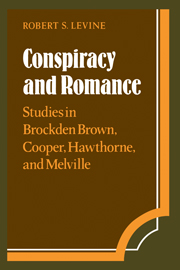1 - “The Defencelessness of Her Condition'
Villainy and Vulnerability in Charles Brockden Brown's Ormond
Published online by Cambridge University Press: 05 June 2012
Summary
We are frequently in most danger when we deem ourselves most safe, and our fortress is taken sometimes through a point, whose weakness nothing, it should seem, but the blindest stupidity, could overlook.
Brown, Memoirs ofCarwinCharles Brockden Brown's novels abound with mysterious villains who for a variety of reasons have fled Europe and emigrated to America. Wanderers in the shifting terrain of his fiction, they are for the most part enigmatic and fearsome, their rootlessness endowing them with an ominous conspiratorial aura. In Wieland (1798) two isolated families in the remote settlements of Pennsylvania are thrown into a state of alarm and confusion when the outsider Carwin begins to visit. Commenting on the native-born Carwin's conversion to Roman Catholicism while in Spain, Clara notes, ‘A suspicion was, sometimes, admitted, that his belief was counterfeited for some political purpose.’ Throughout Ormond (1799) those coming into contact with the mysterious European are brought to wonder about Ormond's identity, origins, and intentions, as the narrator repeatedly alludes to his veiled ‘political projects.’ A pivotal moment in Edgar Huntly (1799) occurs when Edgar reveals why he regards the Irish emigrant Clithero as the chief suspect in Waldegrave's murder: “The more I revolved the pensive and reserved deportment of this man, the ignorance in which we were placed respecting his former situation, his possible motives for abandoning his country … the stronger my suspicions became.”
- Type
- Chapter
- Information
- Conspiracy and RomanceStudies in Brockden Brown, Cooper, Hawthorne, and Melville, pp. 15 - 57Publisher: Cambridge University PressPrint publication year: 1989



